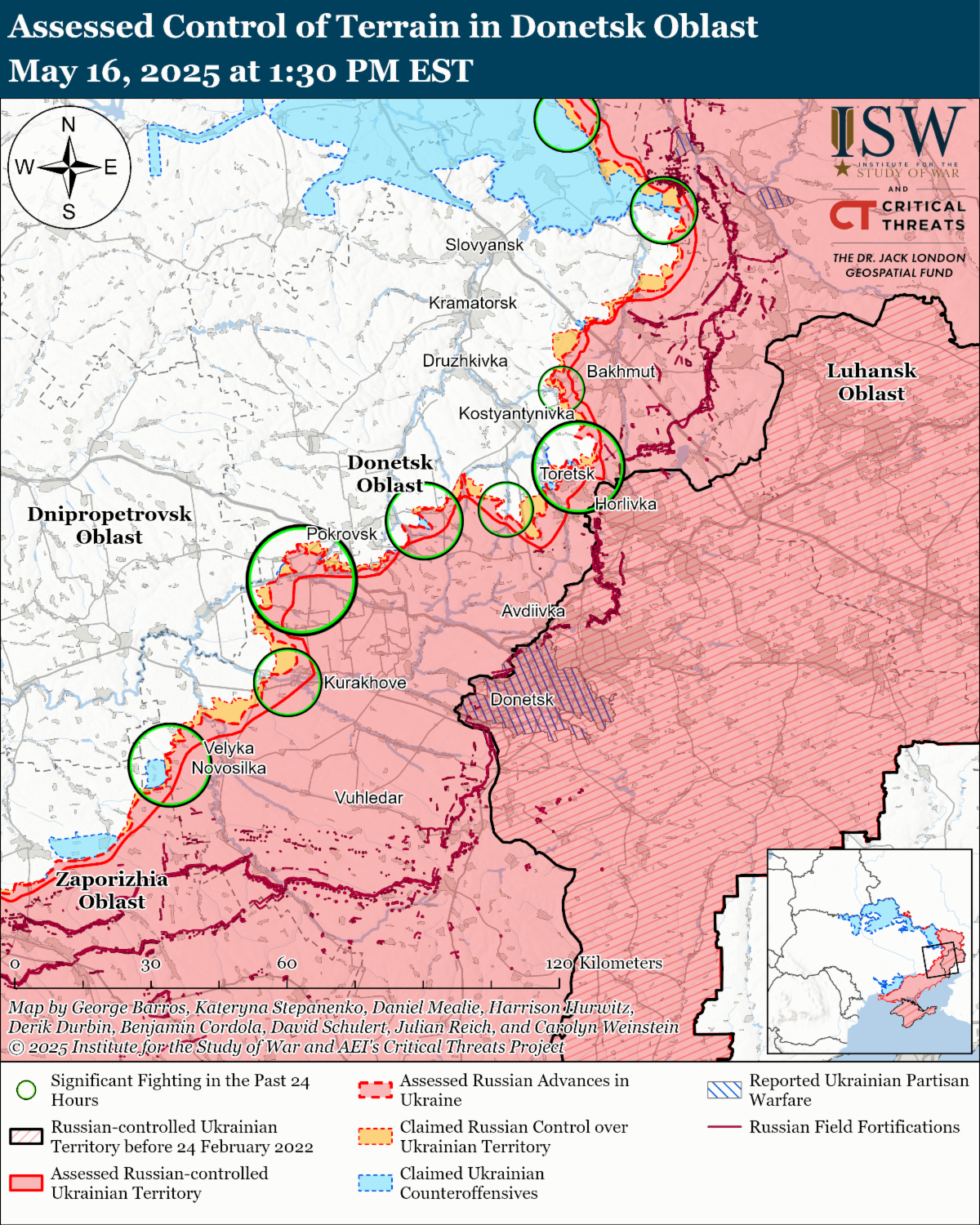Ukrainian and Russian delegations met in Istanbul on May 16 but made little progress towards agreeing to a full ceasefire or a peace settlement to Russia's war against Ukraine. The Russian delegation reportedly formally demanded that Ukraine cede territory to which Russia has informally been laying claim, while asserting that Russia is ready to continue the war for years. Russia may again formalize previously informal territorial claims in the future as part of Russia's effort to secure full Ukrainian capitulation. Turkish, Ukrainian, and American delegations met on the morning of May 16 in Istanbul, after which Turkish, Ukrainian, and Russian delegations met. Russian Presidential Aide Vladimir Medinsky, the head of the Russian delegation, likely met with US State Department Director of Policy Planning Staff Michael Anton before the Ukrainian-Russian meeting. The Ukrainian delegation, including Ukrainian Defense Minister Rustem Umerov, Foreign Minister Andriy Sybiha, and Presidential Administration Chief of Staff Andriy Yermak, met with US Special Envoy to Ukraine General Keith Kellogg, UK National Security Advisor Jonathan Powell, French Presidential Foreign Policy Advisor Emmanuel Bonn, and German Chancellor's Advisor for Foreign and Security Policy Gunter Sautter to coordinate positions before the Ukrainian-Russian meeting. Umerov and Medinsky announced that Ukraine and Russia would exchange 1,000 prisoners of war (POWs) each in the near future. Medinsky stated that the Russian and Ukrainian delegations agreed to "write...down in detail" and present their visions for a possible future ceasefire and that bilateral negotiations will continue after this presentation. Kremlin newswire TASS reported that an unspecified source stated that there was no specific date set for Russia and Ukraine to exchange their ceasefire plans.
Medinsky highlighted that Russia is prepared to continue its war in Ukraine for years to come. Medinsky claimed that those "who do not know history" say that there should be a ceasefire first, then negotiations to achieve peace. Medinsky claimed that war and negotiations should be conducted simultaneously, and Carroll reported that Medinsky stated that Russia is "ready to fight for a year, two, three – however long it takes." Medinsky reportedly referenced the Great Northern War (1700-1721) when asking "how long [is Ukraine] ready to fight?" and claimed that "Russia is prepared to fight forever." Russia state media confirmed that Medinsky spoke about the 18th-century war with Sweden during the meeting.
Ukrainian diplomatic sources told various Western and Ukrainian outlets that the Russian delegation made "unrealistic" and "unacceptable" demands that went "far beyond" any demands Russia has previously discussed. The delegation reportedly repeated the Kremlin's demand that Ukrainian forces withdraw from the entirety of the illegally annexed Luhansk, Donetsk, Zaporizhia, and Kherson oblasts before the start of a ceasefire. The Economist foreign correspondent Oliver Carroll reported that a source stated that the Russian delegation additionally threatened to seize Kharkiv and Sumy oblasts, and Ukrainian Verkhovna Rada Deputy Oleksiy Goncharenko similarly reported that the Russian delegation threatened to annex Sumy Oblast in order to create a "security zone."
Key Takeaways:
- Ukrainian and Russian delegations met in Istanbul on May 16 but made little progress towards agreeing to a full ceasefire or a peace settlement to Russia's war against Ukraine.
- Medinsky highlighted that Russia is prepared to continue its war in Ukraine for years to come.
- The Kremlin has repeatedly publicly demanded that Ukraine cede all of Luhansk, Donetsk, Zaporizhia, and Kherson oblasts – even the territory that Russian forces currently do not occupy - but had not formally demanded that Ukraine cede all of Kharkiv and Sumy oblasts before the May 16 Istanbul meeting.
- ISW has consistently assessed that Russian President Vladimir Putin will not compromise in peace negotiations unless Ukraine and the West inflict significant battlefield and economic losses on Russia and force Putin to rethink his theory of victory.
- Russian President Vladimir Putin reportedly approved a series of command changes in the Russian military, including a new Commander-in-Chief of the Russian Ground Forces.
- Russian forces are continuing to expand their salient northeast of Pokrovsk and southwest of Toretsk, although it remains unclear whether the Russian military command will prioritize further advances towards Kostyantynivka or Pokrovsk during Summer 2025.
- Russia is unlikely to have sufficient manpower, materiel, and operational planning capabilities to conduct both an envelopment of Pokrovsk and a significant offensive operation toward Kostyantynivka in the coming months.
- Russian forces recently advanced near Toretsk, Pokrovsk, and Novopavlivka and in the Zaporizhia direction.
| 




 [ISW] 러시아의 공세 캠페인 평가, 2025년 5월 17일
[ISW] 러시아의 공세 캠페인 평가, 2025년 5월 17일